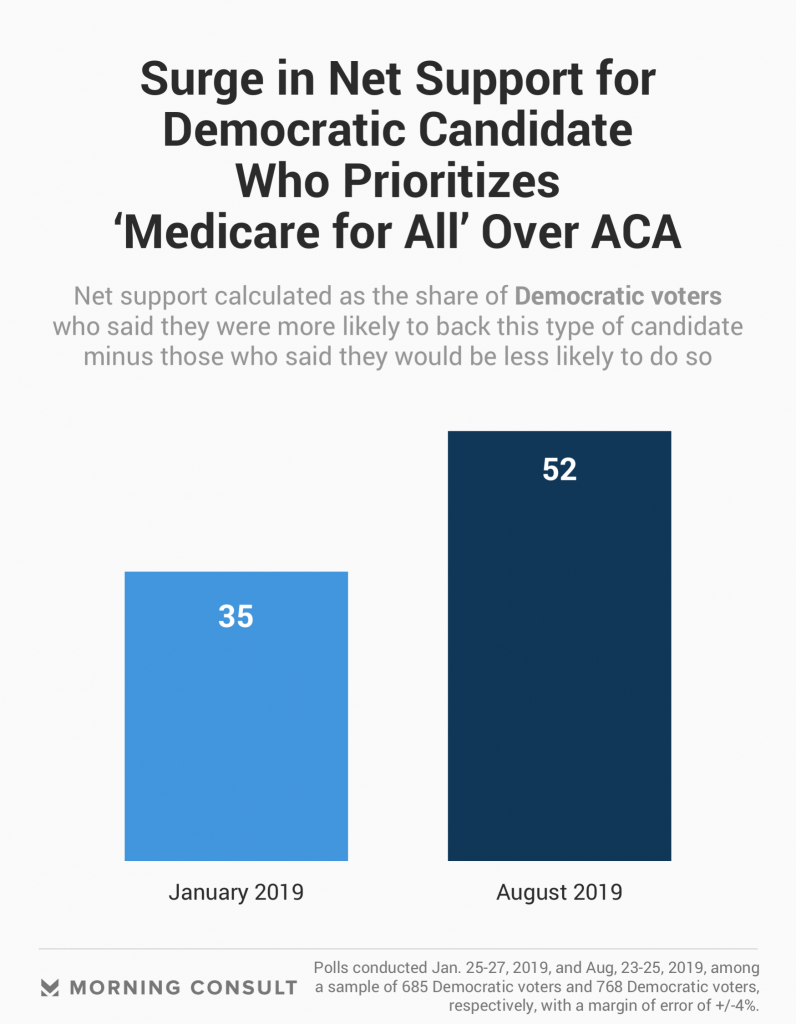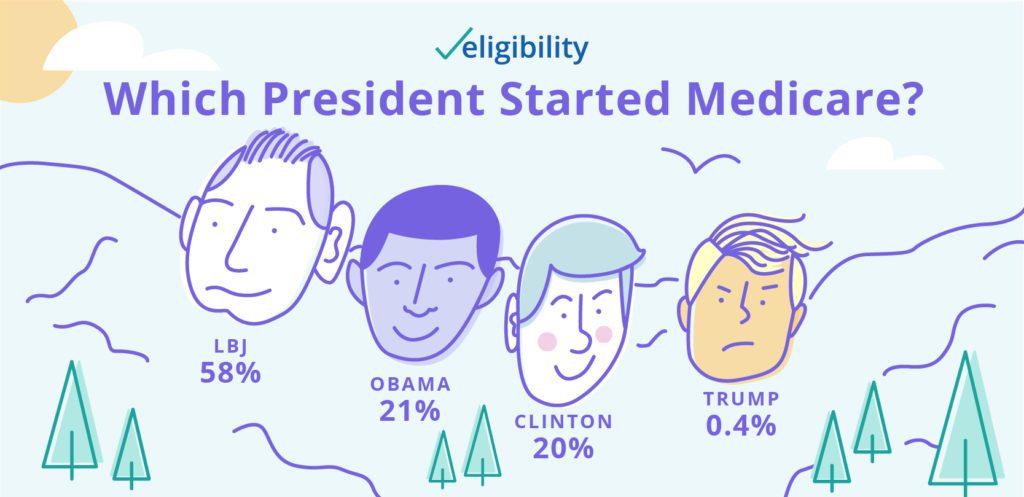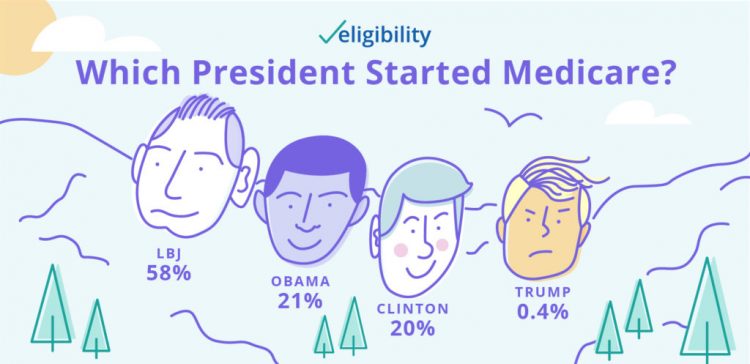Two new data points converge that beg the question in the title of this post. These two surveys are:
- The Morning Consult’s poll published today finding growing support among Democratic voters for Medicare for All as the centerpiece for health reform in America; and,
- A recent study from Eligibility.com on “Medicare Myths Explained,” with the tagline, “How much do you know about Medicare?” Not so very much, Eligibility.com found out.
 Let’s start with the Morning Consult poll results, which compare support for Medicare for All from January 2019 and August 2019. The headline number from this poll is seen in the bar chart: Democratic voters’ “net support” for Medicare for All grew from 35% in January to 52% in August. Net support is defined as the difference between the percent of those likely to back a candidate supporting M4A minus the percent saying they would be less likely to support an M4A Candidate compared with a candidate looking to build on the Affordable Care Act/Obamacare.
Let’s start with the Morning Consult poll results, which compare support for Medicare for All from January 2019 and August 2019. The headline number from this poll is seen in the bar chart: Democratic voters’ “net support” for Medicare for All grew from 35% in January to 52% in August. Net support is defined as the difference between the percent of those likely to back a candidate supporting M4A minus the percent saying they would be less likely to support an M4A Candidate compared with a candidate looking to build on the Affordable Care Act/Obamacare.
Morning Consult points out that “the dialogue around health care has changed from January through August,” with several House Committee hearings exploring Medicare for All; health care a hot topic in both Democratic debates (Round 1 covered here and Round 2 here in Health Populi); and, campaign trail discussions in town halls and State Fairs where health care is a key theme in stump speeches and candidates’ conversations with constituents in diners across America.
Still, the data comes as former Vice President Joe Biden — who has spurned a single-payer system in favor of expanding the ACA with a public option — continues holding tight to his 13-point advantage over Sen. Bernie Sanders (I-Vt.), the party’s loudest supporter of Medicare for All.
In the general election, Dach said, the health care debate will recalibrate on the gulf between the Republican zeal to overturn the ACA and “what the American people want.” That’s because the Democratic primary, and the upcoming general election, is about more than just health care, said Leslie Dach, campaign chair for health care advocacy group Protect Our Care and a former adviser to former Secretary of State Hillary Clinton’s 2016 presidential campaign.
In fact, Democrats’ keen concern for several health care issues — at the top of that list, prescription drug prices, guaranteed coverage for pre-existing conditions, and women’s health care access — drove many voters to the polls in the 2018 mid-term elections.
“And where health care is concerned, Democratic voters respond more to kitchen-table issues,” Dach is quoted in the Morning Consult report.
A caveat to the M4A excitement: note that, “among all voters, net support for a candidate who prefers Medicare for All to the ACA is notably lower, at 13 points in the August survey….Democrats maintain their 14-point edge over Republicans when voters are asked about which party they trust more to handle health care,” Morning Consult notes.
Morning Consult surveyed which surveyed 1,987 registered voters, including 768 Democratic voters between August 23-25, 2019.

Among the 500 U.S. adults surveyed, 50% believed that Medicare is free.
But there’s no such thing as “free Medicare.” As Eligibility.com knows, Part A (hospital services) is “free” if the beneficiary worked sufficiently long and paid into Medicare taxes. Part B for doctors’ services is premium-paid on a monthly basis, running between $133.50 and $460.50 a month. And, Part D, which covers prescription drugs, is an add-on to Medicare sold through private insurance companies for an average of just under $40. But remember…there’s also a donut hole which can add substantial costs to a Medicare enrollees’ health care tab particularly if a person is managing multiple chronic conditions or one requiring a specialty therapy).
Here’s another Medicare myth uncovered: 1 in 4 Americans think Medicare is part of the ACA/Obamacare.
The good news in terms of Medicare-literacy is that 90% of people know that Medicare is not the same as Medicaid.
As for the historical roots of Medicare, Americans get a B-/C+…only 58% of people knew that President Johnson created Medicare in 1965 as part of the larger Great Society program he led in the growing Civil Rights era.
So, what do we know from these two studies? That Americans need an engaging course in Medicare literacy: the good stuff, the expenses involved (first — to know it’s not “free”), and the administrative hassles every Medicare beneficiary knows all too well.





 I'm in amazing company here with other #digitalhealth innovators, thinkers and doers. Thank you to Cristian Cortez Fernandez and Zallud for this recognition; I'm grateful.
I'm in amazing company here with other #digitalhealth innovators, thinkers and doers. Thank you to Cristian Cortez Fernandez and Zallud for this recognition; I'm grateful. Jane was named as a member of the AHIP 2024 Advisory Board, joining some valued colleagues to prepare for the challenges and opportunities facing health plans, systems, and other industry stakeholders.
Jane was named as a member of the AHIP 2024 Advisory Board, joining some valued colleagues to prepare for the challenges and opportunities facing health plans, systems, and other industry stakeholders.  Join Jane at AHIP's annual meeting in Las Vegas: I'll be speaking, moderating a panel, and providing thought leadership on health consumers and bolstering equity, empowerment, and self-care.
Join Jane at AHIP's annual meeting in Las Vegas: I'll be speaking, moderating a panel, and providing thought leadership on health consumers and bolstering equity, empowerment, and self-care.